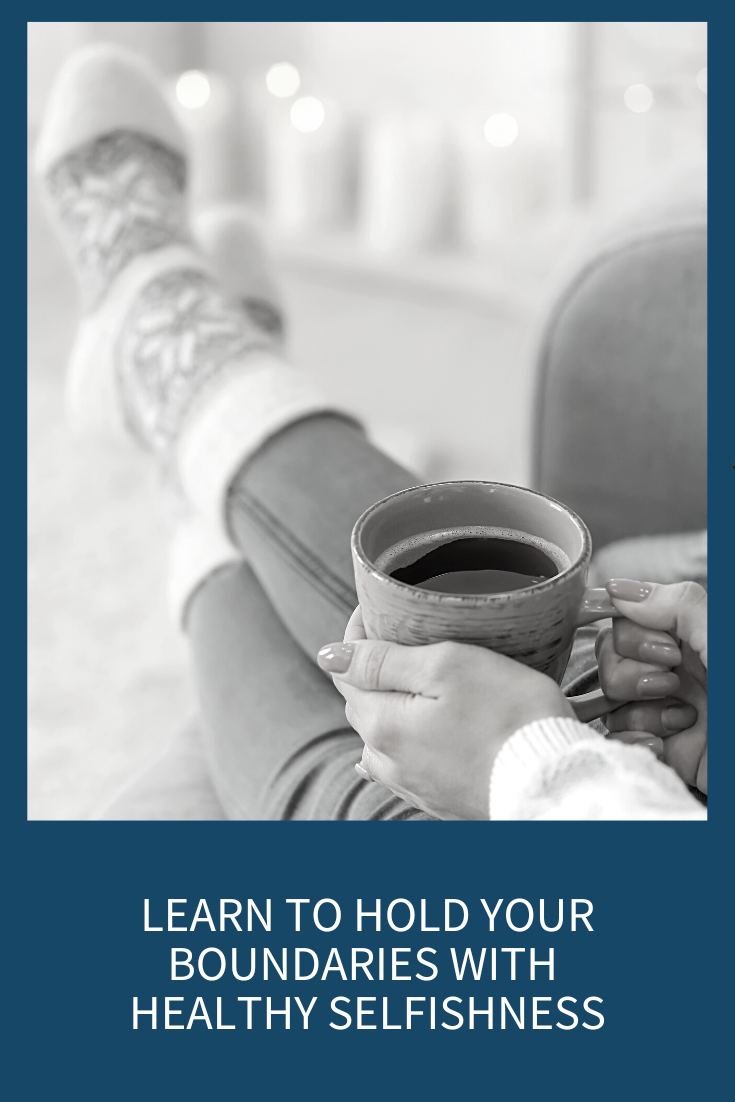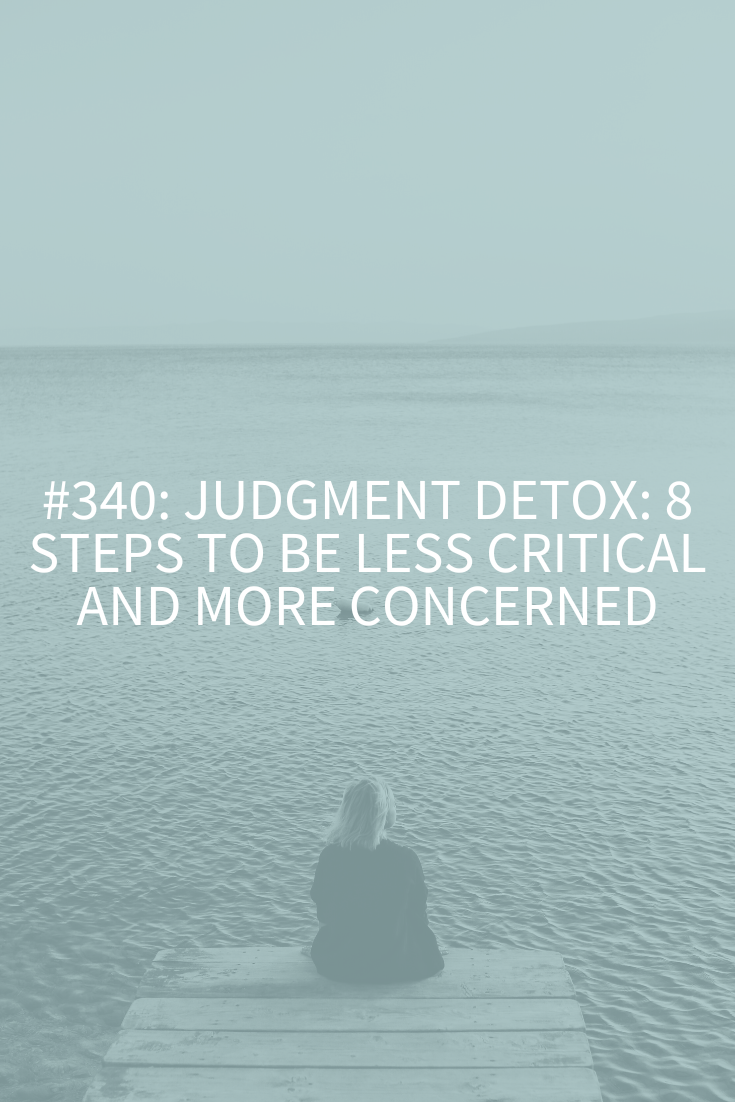
You’ve tried to draw a boundary with your partner, boss or best friend, but they call you selfish, self-absorbed or even narcissistic! How could dare you prioritize yourself over what they want? In my new book, Boundaries Made Easy (which is dropping in just a couple of weeks on 12/5/23), I dispel the myth that holding a boundary is selfish and explain what healthy selfishness is all about. Today, I’m giving you a sneak peek into what selfishness really is and how you can learn to hold your boundaries with healthy selfishness.
6-minute read
Let me tell you about a client of mine who we’ll call Esther. Every year she hosts a big Christmas celebration at her home. Her two siblings and their families fly in, as well as her parents. Her parents stay in the house, and her siblings and their families stay at a nearby bed and breakfast that Esther arranges every year.
At any time over Christmas week, there are at least 10 people roaming around her home, so she feels she has to have food (everyone’s favorites, of course, and remembering her nephew’s gluten allergy too). She also arranges fun things to do in town, movies for the kids to watch, and all other manner of basically operating as her own bed and breakfast for a week.
While it’s wonderful to see her family and create these traditions, she finds that she ends up feeling drained, resentful and frustrated by the end of these holiday weeks. There are some perfunctory “thank you’s” throughout the week, but no one really pitches in or lends any significant help. Esther feels taken for granted and unappreciated. She said to me a couple of months ago, “They have no idea what goes into this week! All the money, planning and lists I need to manage! They’ll call with special requests without thinking what they could do themselves to help, and they’ll even complain if something doesn’t go exactly as planned. They’re so entitled it drives me nuts!”
Esther and I have been working together for many months now, and she’s finally seen that the way she feels towards her family leading up to, during and after this week is anything but loving! And the anger and resentment she feels has been building year after year.
She finally set a boundary this year. She let her family know in August that she wouldn’t be hosting Christmas this year. She let everyone know that they’d decided to spend a week vacationing in the Caribbean instead.
As you might imagine, her family went nuts. She received emails from her mother and both siblings telling her how selfish she was being and how could she do this to them? Everyone loved these weeks and looked forward to them all year! When that didn’t change her mind, they started mentioning how it was hurting her kids and the nieces and nephews to not have this special time together. When that didn’t work, the siblings wrote telling her that it was killing their parents and “you don’t know how much longer we have with them.”
She almost caved many times in this process and was especially enraged at being called selfish when, for so many years, she was so selfless! “Doesn’t that count for anything?!” she cried.
You might relate to this story. You give and give and then, when you draw a boundary, you’re suddenly a horrible person. Being called selfish is a deep blow. If you’re selfish, it means you’re inconsiderate and think of your own needs only.
Here’s the deal for most of us. You were taught either directly or indirectly that it’s selfish to put your own needs first. You might have even been taught that it’s immoral or evil, while being altruistic and giving to others is virtuous or even Godly. In other words, prioritizing yourself over others is just plain wrong. And, if you believe you’re a good person in the world (and who doesn’t want to believe that?), then you can’t be doing selfish things!
Here’s what’s crazy. There’s actually been research about this very issue, and you know what it shows? That healthy selfishness is correlated not only with psychological well-being (less depression, less anxiety and more feelings of calm and peace) but it’s also highly correlated with prosocial behavior. This means that people with healthy selfishness, as paradoxical as it sounds, are more likely to do things that benefit others, so they are more apt to volunteer, share, donate and cooperate.
This is such a critical point that I want to take a minute and go a little deeper. In 1939, the legendary (at least for those in my line of work) German social psychologist Erich Fromm wrote an essay entitled Selfishness and Self-Love. In it he states, “Modern culture is pervaded by a taboo on selfishness. It teaches that to be selfish is sinful and that to love others is virtuous.” He says this results in people feeling guilty for showing themselves healthy self-love. He defined healthy self-love as “the passionate affirmation and respect for one’s own happiness, growth and freedom.”
Taking inspiration from Fromm’s work, the (also legendary) American psychologist Abraham Maslow wrote his own essay, making a clear distinction between healthy and unhealthy selfishness1. Maslow defined healthy selfishness as having a healthy respect for your own health, joy, growth and freedom. And his work argued that having a healthy selfishness has a positive impact on both yourself and the people around you.
In just the last twenty years, there have been many studies around this need for healthy selfishness. It’s usually contrasted with something the research calls pathological altruism, which is generally defined as “a need to sacrifice oneself for the benefit of others.” (Um… codependency anyone?) The research further shows that pathological altruism (aka: codependent behavior) is associated with vulnerable narcissism and selfish motivations for helping other people.
Meanwhile, studies show that healthy selfishness is related to higher life satisfaction, more positive and fulfilling relationships, higher self-esteem and authentic pride in oneself.
What this all means is that, when you’re doing for others from fear-based emotions and thoughts (worry, anxiety, resentment, codependency, low self-esteem), you’re acting in a maladaptive way that’s not truly healthy for you or the other person. It means that not keeping your boundaries is actually what’s selfish.
Practicing Healthy Selfishness
So, how do you practice healthy selfishness? Here are my top three tips:
- The most obvious is to set healthy boundaries for yourself, like my client Esther.
- Making self-care a priority. This can be anything from carving out time to exercise, to making sure you wake up early enough to have a healthy breakfast, to creating time to connect with friends.
- Finding balance in your life. It’s wonderful to help others, but are you giving yourself equal (or more) time for the things that are important to you? Are you taking time to relax and recharge after any output?
Resources: Learn to Hold Your Boundaries with Healthy Selfishness
- Maslow, A.H. (1943/1996). “Is human nature basically selfish?” in Future Visions: The Unpublished Papers of Abraham Maslow, E. Hoffman (Thousand Oaks, CA: Sage Publications), 107-114.






